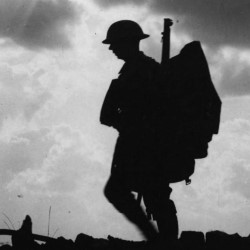It’s very hard these days to convey the horror of the First World War in a new way, or one that can surprise you with its impact. Partly, we’ve been inured to it through repeated exposure to the stories. Partly, it’s because, like everything, it is often easy to reduce it to a handful of common tropes like “going over the top” or the playing of football in no-man’s land. We all know it was hell on earth, we nearly all wear the poppy, or at least sadly acknowledge the innumerable lives lost, but it takes something special to shock us into feeling something new. The Unknown Soldier is special.
Firstly, this one man play focuses on a gruesome aspect of the war that for reasons of drama and delicacy usually gets passed over. There is no glory to be found in the clean-up operation – soldiers mopping up the “porridge” that is the rotted remains of their friends, and somehow finding an even minimally dignified way of dividing them into grave plots. It is a thankless, shattering task that pushes a person’s humanity into dark places it shouldn’t have to go. Yet, our protagonist, Jack, sets about it with a wonderfully down-to-earth human approach. “Well, someone’s got to do it.” There’s a reason for this stoicism…
Because secondly, the play gives lie to the assumption that after Armistice Day, “our boys” all came home to heroes’ welcomes and got on with ordinary lives of marriage and kids and jobs. Some had given beyond everything and had been left with nothing. Our man is one of those. So here he is, two years after ceasefire, still in the trenches, duty to his fallen comrades the only purpose he has. He reminisces of summers in his village pub, but he knows even if he got back there the beer would never taste as good, now his drinking buddies are being shovelled out of the slime of Northern France. Yet he hasn’t allowed bitterness or hate to consume him. Jack is exactly the kind of guy you’d love to be in a village pub with, still.
So Ross Ericson’s play is set up to be good. But it is also passionately and sincerely performed by the writer himself. In truth, he’s probably a little older, and more… ahem… “well-fed” than your typical World War I soldier, but he still rings true. His yokel-ish accent brings a charm and groundedness to his monologues. Ericson is equally good when he leaps out of the main story into a more scene-setting role. There is a particular passage, a first-person account of facing a German sortie which feels terrifyingly real. It runs the gamut of emotions one can only imagine a soldier would have felt – fear, delirium, primeval bloodlust, relief…
The notion of “lions led by donkeys” plays out in The Unknown Soldier, but not in its usual form. The crux of the play, the reason for the title, is that because of Jack’s role he’s needed for the gruesome part of the creation of the Tomb of the Unknown Warrior at Westminster Abbey. As in war, his is not to question why. To his superiors, he’s a grunt, needed to dig and lift, and that’s it. He outwits them, of course, on this creation of a tokenistic memorial to sanitise war, but ultimately, to what end?
The Unknown Soldier is an exemplary piece of solo theatre. It ought to be a theatre trip every English and History teacher takes their classes on. It can certainly hold its head up among the best of war stories.
